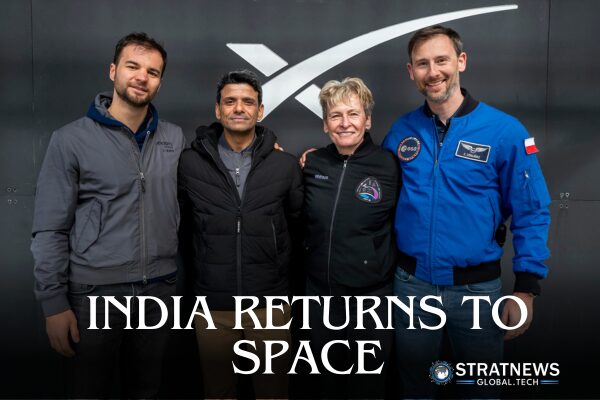As the countdown begins for Axiom Mission 4 (Ax-4), all eyes are on Group Captain Shubhanshu Shukla of the Indian Air Force, who is set to become the first Indian to visit the International Space Station (ISS).
Despite political turbulence sparked by a recent feud between U.S. President Donald Trump and SpaceX CEO Elon Musk—who briefly announced plans to “decommission” his spacecraft before withdrawing the statement—the mission is proceeding on schedule.
The liftoff will take place at 5:52 p.m. IST on June 10 from the Kennedy Space Center in Florida.
This groundbreaking mission, a collaborative effort involving Axiom Space Inc, NASA, ISRO, and SpaceX, marks a significant milestone in India’s space journey.
“An Indian astronaut heading to space again after 40 years via a commercial, frontier-defining partnership is not merely about sending a man to space; it is about placing India squarely at the table where the architecture of the outer space economy is being designed,” said Anil Prakash, Director General of the Satcom Industry Association (SIA-India).
In an exclusive conversation with StratNews Global, Prakash said, “At the confluence of geopolitics and technology, this mission signals that India will no longer be a peripheral player in humanity’s extraterrestrial aspirations. It will be a shaper, a co-author of the next orbital chapter.”
Alongside Shukla, the Ax-4 crew includes former NASA astronaut and mission commander Peggy Whitson, Slawosz Uznanski-Wisniewski from Poland, and Tibor Kapu from Hungary.
As reported previously, for 14 days aboard the ISS, they will undertake a series of scientific, commercial, and outreach activities designed to generate valuable data and foster international cooperation.
“For the Gaganyaan program, this mission is both rehearsal and revelation,” Prakash noted. “The microgravity experiments conducted by Grp Capt. Shukla, spanning material sciences to biomedical research, serves as significant proof points for India’s future indigenous missions.”
These experiments will play a vital role in shaping India’s capabilities in human spaceflight, particularly in life-support systems, payload design, and mission endurance.
The onboard research—ranging from the study of stem cell behaviour in microgravity to evaluating thermal performance of Indian composite materials—is as strategic as it is scientific.
“For India, these experiments offer critical empirical data that will sharpen our payload design, enhance our biomedical protocols for human spaceflight, and unlock scalable models for in-orbit production in the years to come,” said Prakash.
“This mission is important because it externalizes and validates India’s technological acumen in a collaborative yet competitive ecosystem.”
Looking ahead, India’s growing role in space will take centre stage at the India Space Congress 2025, scheduled from June 25–27 in New Delhi. A dedicated session titled ‘Pioneering Human Spaceflight: India’s Astronaut Journey’ will explore how international partnerships and scientific innovation are securing India’s place among the leading human spacefaring nations.


